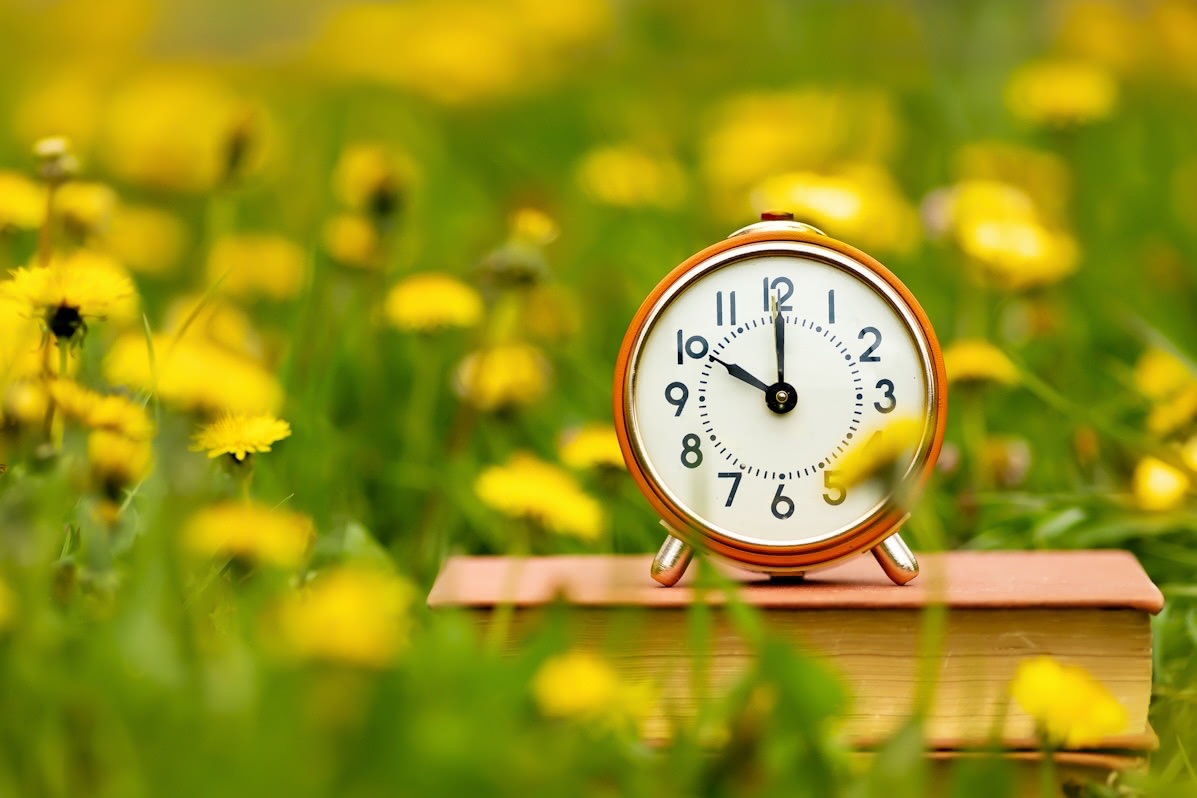A to Zzz: Easing Into a Time Change
Mar 1, 2024

Nothing stops time — it just marches on.
But when spring and fall time changes roll around or a plane ride takes us swiftly across time zones, time takes a quirky little turn. It may not seem like a big change, but even just one hour’s difference can mess with our minds, body clocks and routines — especially sleep-wake cycles.
In fact, sleep disturbances can lead to a host of health and safety concerns, the Sleep Foundation says. Especially during the switch to and from Daylight Saving Time (DST), heart problems, mood issues, insomnia and traffic accidents tend to increase.
Babies, children and teens experience the effects of time changes too. Sleep loss can lead to cranky kids at home and groggy teens who have trouble focusing at school, the American Academy of Pediatrics reports.
Most people adjust to DST changes within a few weeks, but some never fully adapt. That chronic misalignment, along with pressing school and work demands, has been linked to a higher risk of obesity, depression and cardiovascular disease, the Sleep Foundation explains.
Tips for time transitions
Since twice-yearly clock changes are inevitable and long trips common, is there any hope for a smoother transition?
The answer is yes, says C. Cameron Hagen, MD, sleep specialist at Adventist Health Portland. “Time changes don’t have to catch us by surprise,” he says. “If we make gradual, intentional shifts to our routines in the days and weeks leading up to a clock change or trip to a different time zone, we can ease our way through and maintain a healthy sleep schedule.”
Here are sleep-savvy tips to help you — and your kids — navigate a time change.
Babies and toddlers
- First, keep in mind newborns typically don’t have regular sleep cycles right away. That can take several weeks to a few months. Even after that, sleep schedules can vary quite a bit. Parents can help encourage sleep at night by staying calm and quiet, speaking softly and moving gently.
- Set daytime as playtime. Keeping babies awake longer during the day can help them sleep for longer periods at night. Talking, singing and playing together during the day helps engage your little one.
- Make gradual shifts. “The most natural approach for infants and toddlers is to enhance the light-dark cycle for the desired bedtime and wake time,” Dr. Hagen says. “This includes dimming down lights with relaxing, non-screen-related quiet activity in the hour before the goal bedtime and increasing light exposure and physical activity at the goal wake time.”
School-age kids
- Start nudging naps and bedtimes in the direction your clocks will be moving. Make gradual, purposeful shifts of a few minutes each day starting about a week before a time change.
- Play outside and soak in the sunshine earlier in the day. Natural light during the day has a strong effect on your child’s body rhythm.
- Use regular routines like warm baths, reading or listening to soft music in the evening to signal it’s time to sleep. Choose calm activities that don’t involve electronics or screens.
- Try aromatherapy to help your child relax. Soothing scents like lavender have been shown to help people fall asleep faster, the AAP says.
- Ask your pediatrician or family medicine provider if a melatonin supplement would be OK for a short time.
- Think about your child’s natural sleep tendencies and adjust accordingly to the direction of the time change. “The general rule is that natural night owls don’t need help adjusting when traveling westward, like to Hawaii, but they do benefit from starting to adjust a week in advance before traveling eastward,” Dr. Hagen says. Daylight Saving Time follows a similar pattern: The fall change is like traveling west one time zone, and the spring change is like traveling east one time zone.
Teens
- Encourage older kids to wind down a bit earlier each night, especially starting a week or so before the spring time change or eastward travel.
- Eat dinner earlier in the evening. Meals that happen too close to bedtime can cause indigestion and make it harder for your teen to fall asleep and stay asleep.
- Limit screen time before bed. Blue light from phones, computers, tablets and TV can trick the brain into thinking it’s daytime. Charge devices outside their bedroom to limit the temptation to check messages.
- Get teens plenty of exercise during the day. Have them wind down in the evening with quiet activities like stretching, yoga or reading.
Kids of all ages usually adapt to time changes within a week or so, the AAP says. But if your child has continued sleep troubles after that, consult their provider.
Adults
- Keep a consistent sleep routine. Aim for at least seven hours of sleep before and after changing times to help prepare.
- Shift your sleep and wake-up times gradually. For instance, a few days before the DST switch in March, wake up 15–20 minutes earlier than usual. Then on the Saturday before the time change, set your alarm back for an additional 15–20 minutes. In the fall, shift your bedtime later each night.
- Spend time outside midday to signal your body it’s time to be awake. “Exercise and bright light exposure, timed properly today, has a strong impact on the time of our sleep both today and tomorrow,” Dr. Hagen says. Before a time change, move your exposure earlier or later in the day to adapt to the new time.
- Avoid caffeine late in the day. Consuming caffeine within six hours of bedtime can disrupt your sleep cycle. Other substances can make sleep challenging too, including alcohol and tobacco.
- Take a nap if you feel sleepy, but keep it short. Consider afternoon naps of 20 minutes or less to prevent feeling groggy after.
- Ask your health provider if low-dose melatonin would be OK for a limited time before eastward travel and before the spring time change. Dr. Hagen cautions that melatonin tends to be overused and isn’t always helpful. Melatonin can even pose risks, he says; research has shown some brands are contaminated with sedatives not listed on the label. Follow your provider’s advice, and choose a brand validated by an independent laboratory.
If you are struggling with ongoing sleep problems, talk to your primary care provider or contact our sleep team at (503) 261-4475 or visit AdventistHealth.org/PortlandSleep.


